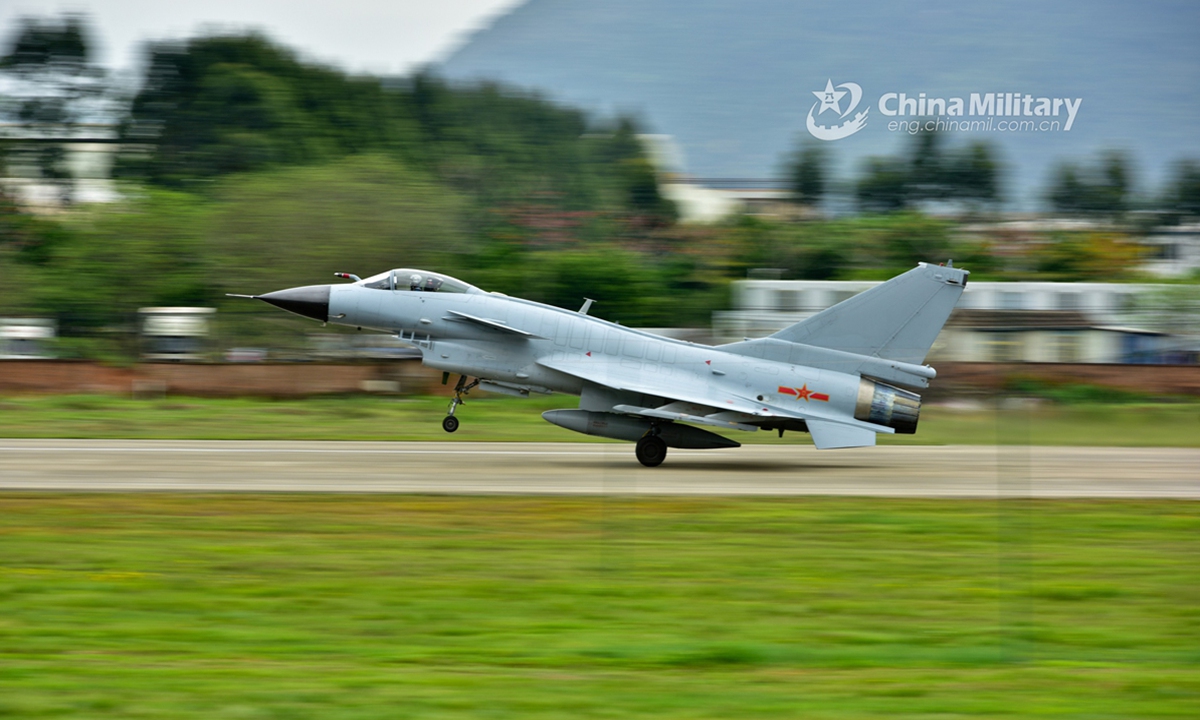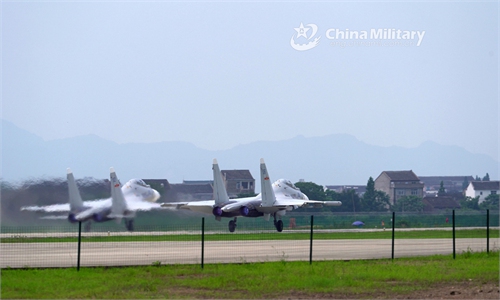
A J-10 fighter jet attached to an aviation brigade of the air force under the PLA Southern Theater Command takes off for an air combat training sortie on May 23, 2020. Photo: eng.chinamil.com.cn
The US and the island of Taiwan should be held accountable for rising tensions in the Taiwan Straits. As the risk of accidental conflict rises, Taiwan-based newspaper China Times on Monday cited a source saying that the island's military has forbidden its pilots from firing without orders, and that pilots who violate this order will be punished immediately after landing. We believe that the island's military must strictly abide by the rule.
It is also believed that the Chinese People's Liberation Army (PLA), the US army and the island of Taiwan's military should all conform to the principle of not firing the first shot in the Taiwan Straits, and officially inform one another about this. Such a move will help troops correctly judge others' intentions to avoid tensions, and reduce the possibility of an unintended accidental conflict.
As the China-US strategic game escalates, both countries have increased military activities off China. The possibility of troops from the two sides encountering each other has increased. Thus, it is more urgent to better understand each other's intentions. Neither China nor the US is willing to engage in a war at the moment, but both are preparing for an out-of-control situation. Now could be the period with the highest risk of an accidental conflict in China's coastal waters, especially in the Taiwan Straits, since 1996.
It is much harder for China and the US to put a situation under control and address the crisis through peaceful means than in the past. Once an accidental conflict or something similar to the China-US aircraft collision in 2001 occurs, public opinion in both countries will be set ablaze and make it extremely difficult for the two governments to make any compromise.
Not firing the first shot should be the principle of troops from the Chinese mainland, the island of Taiwan, and the US. Any soldier from the three sides who stick to this principle can be considered a peacekeeper.
Nonetheless, cross-Straits peace should not depend only on soldiers. Easing tensions politically shall be the proper path to ensure a long-lasting peace. If politicians from the US and the island of Taiwan do not stop making waves in the Taiwan Straits while continuing to intensify the situation, an accidental conflict will be highly probable.
For the Chinese mainland, not to fire the first shot does not mean it is weak or soft. Stopping a war and meeting the enemy head-on are both sacred missions for the military.
It has never been shameful for any military to avoid a damaging conflict. If the PLA refrains from firing first, but is still attacked, it will respond with overwhelming force.
Not firing first is a routine for frontline soldiers rather than strategic constraints for any country. If Democratic Progressive Party (DPP) authorities on the island of Taiwan cross the redline, and if actual moves to divide China in the Taiwan Straits emerge, the Chinese mainland's military forces will use all means possible, including resorting to a war, to stop that. At that time, the PLA will not only fight an anti-secession war, but also solve the Taiwan question for good.
Between peace and war in the Taiwan Straits, there are growing uncertainties. The US and the island of Taiwan on one side and the Chinese mainland on the other are engaged in increasingly risky political and military games in which the island's secessionist tendency and the US' ambition to contain China are escalating the situation.
The PLA should strengthen its drills when the US and island of Taiwan further provoke. The PLA's fighter jets should fly closer to the island and even over it. Taiwan must be warned that the PLA is capable of smashing its secessionist forces whenever necessary.
The Chinese mainland believes in peace. But it also has the courage and strength to safeguard its national unity, even through a war. So, peace or war? It is up to the DPP authorities and Washington.

